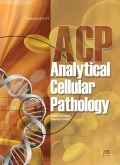Authors: Claessen, Marian M.H. | Schipper, Marguerite E.I. | Oldenburg, Bas | Siersema, Peter D. | Offerhaus, G. Johan A. | Vleggaar, Frank P.
Article Type:
Research Article
Abstract:
Objectives: The Wnt-pathway dominates the sporadic carcinogenesis whereas p53 plays a pivotal role in the colitis-associated counterpart. The expression of Wnt-signaling proteins and p53 during colitis-associated carcinogenesis was determined. Methods: A tissue microarray was constructed with colonic samples from 5 groups of patients: controls (C, n=10), IBD without neoplasia (IBD, n=12), non-dysplastic IBD with neoplasia elsewhere in the colon (IBD-NE, n=12), dysplastic lesion in IBD (IBD-DYS, n=12), and IBD-associated colorectal cancer (IBD-CRC, n=10). Immunohistochemistry was performed for β-catenin, cyclin D1 and p53. p53 sequence analysis was performed in some cases. Results: Nuclear β-catenin expression was found in 0%,
…0%, 50%, 55% and 100% of the patients in the C-, IBD-, IBD-NE-, IBD-DYS- and IBD-CRC-groups, respectively. Non-dysplastic IBD mucosa with neoplasia detected elsewhere showed nuclear expression in 50% of the cases compared to 0% in IBD mucosa without neoplasia (p=0.02). Cyclin D1 staining had similar expression patterns. Overexpression of p53 was only detected in the IBD-DYS (66.7%) and IBD-CRC groups (50%). Conclusion: In contrast to previous findings, our results suggest activation of the Wnt-pathway in the early phase of colitis-associated carcinogenesis. Furthermore, as Wnt activation was observed in 50% of the IBD-NE cases, nuclear β-catenin may facilitate detection of neoplasia.
Show more
Keywords: Colorectal cancer, inflammatory bowel disease, Wnt-pathway, surveillance, p53
DOI: 10.3233/CLO-2009-0503
Citation: Analytical Cellular Pathology,
vol. 32, no. 4, pp. 303-310, 2010
Price: EUR 27.50





